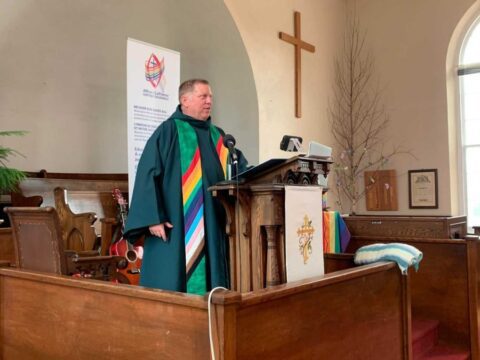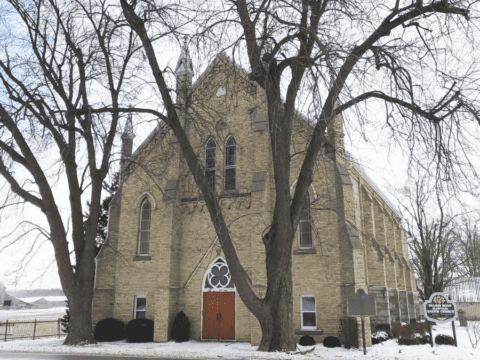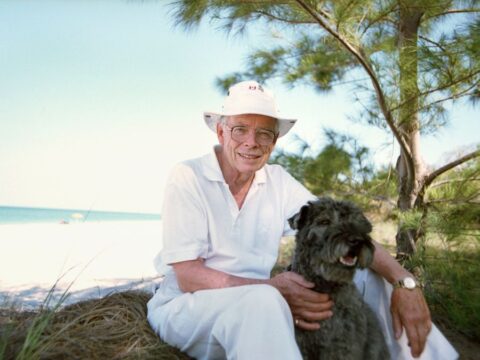About 23 percent of pastoral charge governing bodies in the United Church have yet to cast a ballot on the remit to allow the Indigenous Church to be self-determining, with just days left to vote before the March 31 deadline.
The remit requires the approval of a majority of regional councils and pastoral-charge governing bodies to determine whether The United Church of Canada agrees with removing structural barriers to the Indigenous Church’s independence. Abstention is a no vote in this kind of remit. If the remit passes, the Indigenous Church can decide its own place within the United Church without having to ask permission to make changes.
You may unsubscribe from any of our newsletters at any time.
At meetings during May and June last year, regional council delegates voted strongly in favour of the remit. While a majority of pastoral charges have logged their decision, some observers are worried the remit could still fail.
As of March 26, about 77 percent of pastoral charges had sent in their votes for Remit 1. “The overall number of confirmed votes has been steadily increasing since mid-January, and we anticipate that the voting totals will continue to increase,” Adele Halliday, the United Church’s anti-racism equity lead, wrote in an email.
But Rev. Thérèse Samuel, minister of right relations and social justice for Antler River Watershed, Western Ontario Waterways and Horseshoe Falls regional councils, has heard from congregations who say the discussion is too big and the decision too difficult.
More on Broadview:
- Vote to support Indigenous church decide its future would show ‘we are our own elders’: gathering delegate
- United Church pauses applications from admission ministers due to many international candidates not finding jobs
- Clergy protest United Church’s decision to elevate designated lay ministers’ authority to the same level as ordained ministers
Samuel encourages people who feel daunted by the task to ask themselves: “Can I trust the regional council and the General Council who have studied, discussed and had a tremendous amount of conversation and made a decision that this is what they would like to do?”
In a Nov. 8 virtual town hall discussion about the remit hosted by Pacific Mountain Regional Council, Sara Stratton, the United Church’s reconciliation and Indigenous justice animator, noted, “Decolonization is really hard for an institution as large and as embedded in colonialism as the church is, but [the remit] is an attempt to begin to try and decolonize our relationships.”
“If the remit passes, it will be a substantial step toward decolonization,” says Rev. Cathy Hird, who headed the Remit Reach-Out for Antler River Watershed, Western Ontario Waterways and Horseshoe Falls regional councils. She thinks the remit was an opportunity to move a considerable number of people along in that conversation.
Following a proposal from the National Indigenous Council (NIC), the 44th General Council approved an amendment to the church’s organization during its July 2022 meetings to establish a self-determining Indigenous Church. The NIC voted in favour last August.
“It is much better if the pastoral charge has that conversation because they’ve at least raised the issues and understand why they’re leaning the way that they’re leaning,” Hird says. According to Halliday, some pastoral charges waited until a later date to vote so “they could take additional time to read, study and reflect on the Remit 1 background materials before voting.”
“Change is scary,” says Leeann Shimoda, chairperson of the NIC. “I’m sure it’s just as scary for the Indigenous Church as it is for the mainstream church.”
If the remit fails, Shimoda explains that Indigenous people would be let down that more progress hasn’t been made through Truth and Reconciliation. “That would be probably the biggest disappointment, is that people weren’t ready yet,” she says of the mainstream church.
Still, Samuel says that if the remit were to fail because a huge number of people did not vote, “that sends a very different message than if the remit fails because a majority of people voted no.”
“Because,” elaborates Hird, “if a pastoral church doesn’t vote, it is effectively a no.” She explains that by not engaging in the conversation, pastoral charges are having an effect on the whole structure of the United Church.
“It’s exciting to have the conversations that have never existed before,” says Shimoda. Even if the remit doesn’t pass, she adds, the relationship between the NIC and the United Church will still move forward because the passing of proposal NIC01 in 2022 “changed the lens from mission to partnership.”
“Really, what the whole remit is about is just changing our relationship from that of a mission – helping the ‘poor Indian’ – to being a partner where we have the ability to make changes that are culturally appropriate,” she says.
With the March 31 deadline being Easter Sunday, Samuel and Hird urge those who still need to vote to submit their ballot by email to avoid potential mail delays related to Good Friday.
***
Leslie Sinclair is a freelance journalist in Toronto.













